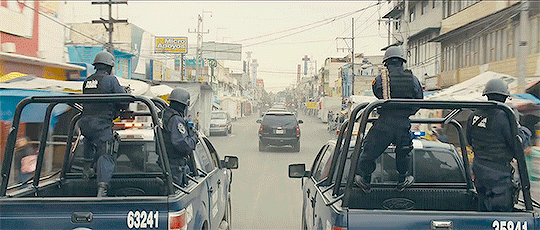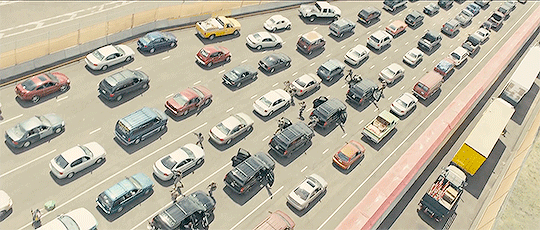The Thrilling & Haunting Sicario
Review of Denis Villeneuve’s action-packed and attention grabbing 2015 film Sicario, starring Emily Blunt, Josh Brolin, and Benicio Del Toro.
The film opens with the words, “In Mexico, Sicario means hitman”, which is to say; this film involves death. In a ‘hope-you-haven’t-eaten-recently’ opening scene, Villeneuve introduces us to just how raw and ever present death is in this film: dozens of mutilated and suffocated bodies plastered into the walls of a house Kate Macer [Blunt] has just raided.

Enlisted in a special government task force, Kate begins her journey from tough FBI hostage specialist to a naive and frustrated pawn. Blunt becomes the audience’s viewpoint to the less than ethical team that is Josh Brolin and Benicio Del Toro.
Having seen first hand what the Mexican drug cartels can do—highlighted by an explosion of the aforementioned house that kills two police officers—Kate, and partner Reggie Wayne [Daniel Kaluuya], agree to join the special team.
Akin to the unpredictability of violence in No Country For Old Men, Sicario builds tension in such a real and frightening way it’s impossible to ever shake the feeling that something bad is going to happen.
For the first mission we are taken across the border—following a private jet flight of mostly nonverbal character exploration—to collect a cartel leader and return them to US soil. I took two key points regarding raw fear away from this scene.
Once in Mexico, the convoy of black Chevy Tahoes is flanked by at least twice as many Mexican state police vehicles. Each vehicle with two officers on the rear tray, both in control of huge chain guns. I’ve never felt more fearful and insecure while watching a film.

Even with infinitely more firepower support than the cast of Fast & Furious ever needed to take over a city, I felt unsafe. Blunt conveyed this fear excellently while having severely insufficient firepower (only a pistol) for the situation—Kate often found herself with inappropriate equipment, highlighting just how in over her head she was.
The second take away I had from this scene was just how few bullets were fired. When the characters fired their guns they did something rather unique in Hollywood; fired only the bullets needed to control the situation.
Villeneuve managed to deliver the action and adrenaline of the this scene without a superfluous gun fight. By restricting the fire-fight to the bare minimum, coupled with the pseudo documentary shots, Villeneuve created an unparalleled level of stress and realism.

The action scenes did not follow the modern tendency for lots of short cuts to heighten intensity. Instead Villeneuve shows the brutal, fast and unpredictable nature of real world fights. So much happens off screen, and in such quick bursts that you’re left trying to conclude what just happened, unsure of how bad it might be.
With that said, the film overuses aerial establishing shots to the point they start to remove you from the story. We understand this is empty desert, it’s hostile land even without the war. Furthermore, the shock value of the countless bodies wears off long before Villeneuve stops shoving them in your face.
Prior to viewing, it is easy to misconstrue the film as a commentary about the horrors of Mexican cartels. Post viewing it is easy to see it solely as a scathing condemnation of US tactics to take down these cartels.
Sicario is both. It highlights the inefficiencies in government attempts at stopping the horrific acts of the cartels. It brings light to the power of personal vendettas, and in a way Revenge could never achieve, makes you question at what point is too far—how many innocent lives must be lost?
And most importantly; who really is innocent?
Fear and tension are present in every frame of this film. There is no escape. No lull in the middle. The scenes that other films might have used to give the audience a breath evoke more uncertainty, because in this world nothing and no one is ever safe.

The action scenes will thrill and excite most viewers. The moral and intellectual questions will haunt you for having enjoyed the action.
Villeneuve presents an interesting mixture of raw action and intense moral dilemma. He portrays the war on drugs “more in sorrow than anger [and] mourns the long-term costs of short-term gains” (David Edelstein, NPR Fresh Air).
“We dread the failure of his mission while dreading the impact of his success”
David Edelstein
It leaves you wondering, is there really an end to this gruesome and ethically unsound war? Villeneuve, nor any of the characters, give an answer. You’re left feeling as hopeless as Kate, except you just enjoyed a movie, instead of living it for real.
